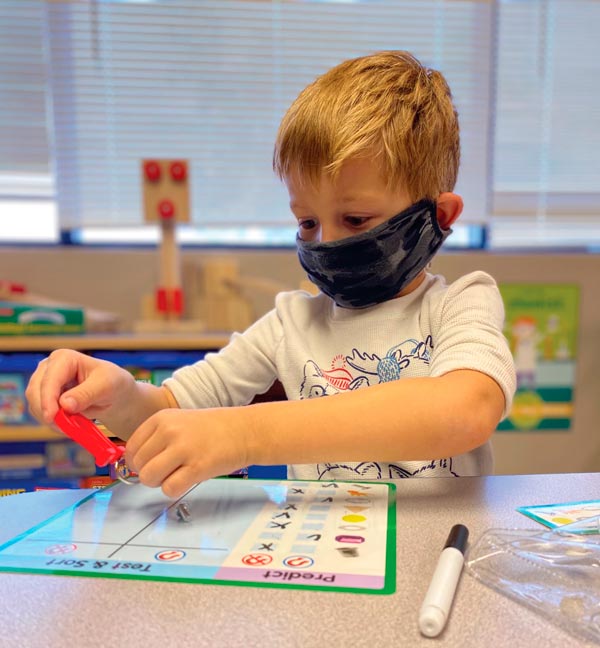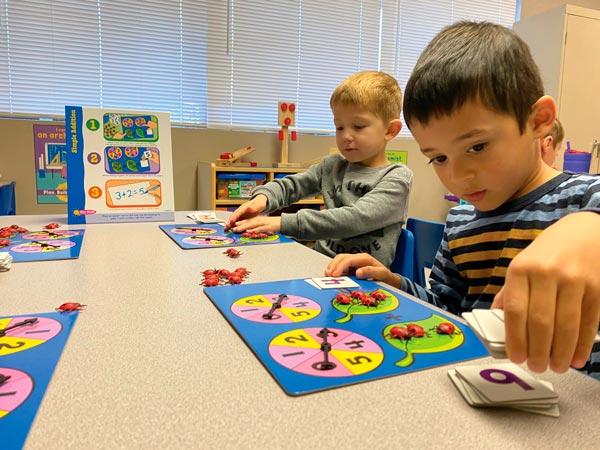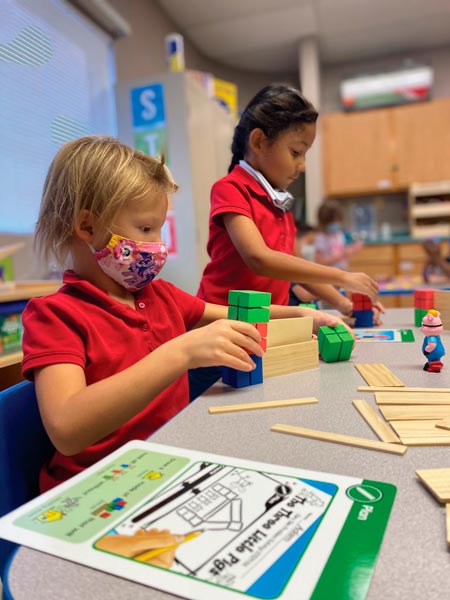“It was a bittersweet day when my child graduated 8th grade from Self Development Academy (SDA) last week. It was exciting to see him go on to the next chapter in his life, but it meant his time at SDA was over. He has attended SDA since he was a toddler at Self Development Preschool. SDA has given him the knowledge he needs to be successful as he moves on. He will be attending a large, public high school in their STEM diploma program. He is prepared and will be taking Honors Algebra II and Honors Biology among his classes as a freshman. Thank you, SDA, for preparing my son for the next chapter in his life.” —written by a parent of a former student
At Self Development Preschool and Academy, we take early math literacy seriously. We recognize the critical role of math literacy for school success and beyond. Our math curriculum is aligned both vertically and horizontally from preschool to grade 8, an extraordinary feature of an excellent educational program.
Math literacy is not just counting numbers or memorizing the names of the geometrical shapes or formulas. Math literacy is the ability to problem-solve, use critical thinking, logic, and reasoning, and evaluate and analyze information.
The early math literacy program at Self Development Preschool and Academy supports the development of mathematical thinking from ages two years old to 8 years, from preschool to second grade. The philosophy of the highly rigorous curriculum even at the preschool level is research based and relies on several assumptions and beliefs. First, mathematical thinking helps children become critical thinkers, which brings meaning and an understanding of their everyday experiences. The enjoyment of the process of learning early math lays the foundation for later success. In upper elementary grades, they excitedly claim, “We love math. Math is easy.”
Second, early math literacy is critical to early childhood education. By beginning with simple concepts and moving to more complex thinking, young children develop the skills of mathematical and methodical thinking through play. At the preschool age, as children develop their self-concept, they rely on their preferences, what they like and what they don’t.
Third, developing a love and understanding of math in the early years requires effective teaching strategies. Unfortunately, research shows that most preschools are not teaching math skills. Teaching math is almost non-existent in most early childhood programs, with one study noting that less than a minute a day was spent in preschools.
Effective math teaching emphasizes the important concepts in math and explains the why of those concepts.
The early math literacy program at SDA helps students connect new ideas to the concepts with which they are already familiar and nurtures students to develop a deeper understanding of mathematical ideas. Students become problem-solvers.
DEVELOPING THE NUMBER SENSE
In many early childhood programs, the most popular method of teaching mathematics is by rote counting, similar to singing the alphabet. However, learning to count may teach children number words and the order of numbers but does not develop a number sense.
Number sense is the ability to understand the quantity of a set of items and the name associated with that quantity. Children progress past repetitive counting and are able to count logically, by relating one number to each item, using the correct sequence. This understanding of the number of items is called one-to-one correspondence. Young children count the objects one at a time and are able to answer how many objects are in the set.
At SDA, the focus on the development of a strong number sense in the early years lays the foundation for excelling in mathematics in elementary school by connecting counting numbers to a number of objects and enhances the understanding of quantities and measurements. As children begin to hone their skills in number sense, they are developing the ability to quickly estimate the number of items in sets. This process is called subitizing, the ability to assess what is more or less.
MEASUREMENTS, GEOMETRY, PATTERNS, AND MUCH MORE
An enriched math program at SDA exposes children to the math concepts that are more relatable to children. For example, counting two dinosaurs and then adding one more. Sorting dinosaurs in groups based on size, both small and large, characteristics such as spikes and no spikes, or arranging them from shortest to tallest. Children begin to develop an understanding of numeracy when they learn what each number represents. Additionally, children are building skills of scientific inquiry through activities such as sorting, comparing, and identifying similarities and differences between objects.
One of the critical components of a quality preschool program is block play. By using blocks of various shapes and sizes, children learn about spatial literacy. Spatial literacy requires familiarity with shapes and spatial skills. Research shows that developed spatial literacy not only helps in later success in math and reading but leads to increased children’s IQ. For developing spatial vocabulary, or the Language of Space, SDA emphasizes the use of words such as front, behind, over, under, in, and out.
These words help them follow directions once they begin formal schooling.
Identifying and creating patterns help children make predictions, inferences, and develop logic and reasoning skills. Understanding the concept of growing patterns in counting provides them a basis for multiplication. Popular preschool games such as walk-tiptoe-jump and crawl and repeat helps the development of kinetic intelligence.
By incorporating games and fun activities, students develop a love for mathematics and find it easy to solve even complex problems. I often teach math at our upper elementary level and sometimes in middle school grades.
It is such a pleasure to have students say, “Dr. Majeed, you make learning math fun!” Students find mathematics fun and learn at a higher level because many of the students have attended Self Development Preschool and early grades, and have been purposefully exposed to early math literacy curriculum.
Self Development Academy’s goal for the coming year is to strengthen our effort to lay a strong foundation for an early literacy program. Inquire about how we can help your child develop a love of learning, become an avid reader, and acquire mathematical thinking.
For more information, please call Self Development Academy or Self Development Preschool at (480) 641-2640 or visit selfdevelopmentacademy.com




